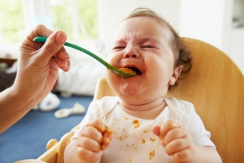
As a parent, it can feel frustrating when we work so hard to get dinner on the table only to have our children take two or three bites. It can be tempting to try and force them to keep eating and clear their plate.
1.1.Why do some parents force their children to eat?
A To waste food.
B To show respect to food makers.
C To save their time and energy.
D To encourage kids.
解析:选B。B 细节理解题。根据第二段中的“View of finishing food as a sign of respect for the person who made the food.”可知,有些人把吃完食物看作是对制作食物的人的尊重。故选B。
2.2.What does the underlined part “steer clear of” probably mean?
A Get rid of.
B Pay attention to.
C Take care of.
D Make use of.
解析:选A。A 词义猜测题。根据划线单词后文的“This kind of thinking doesn’t actually serve our children.”可知,专业人士认为这种想法并不能真正地有益于孩子。由此可推知,专业人士鼓励父母“放弃;避开”让孩子必须把食物吃完的心态。故选A。
3.3.According to professionals, encouraging kids to finish everything on the plate ______.
A can build up their confidence
B can cause sleep disorders
C can destroy their trust
D can form good habits
解析:选C。C 细节理解题,根据倒数第二段中的“We are not establishing a sense of trust in our children”可知,专业人士认为强迫孩子吃完食物这一行为没有给孩子灌输信任感,可能会让他们在日后的生活中怀疑自己。故选C。
4.4.Which of the following topics is NOT related to the passage?
A Why Won’t My Child Listen to Me?
B Why Eating Together Is Important.
C An Age-by-age Guide to Playing with Your Kid.
D How to Encourage Your Child’s Hobbies.
解析:选B。B 推理判断题。根据全文内容可知,文章主要是讲的儿童喂养的问题,是关于育儿的,故跟本文最不相关的话题是第二个(为什么一起用餐很重要)。故选B。